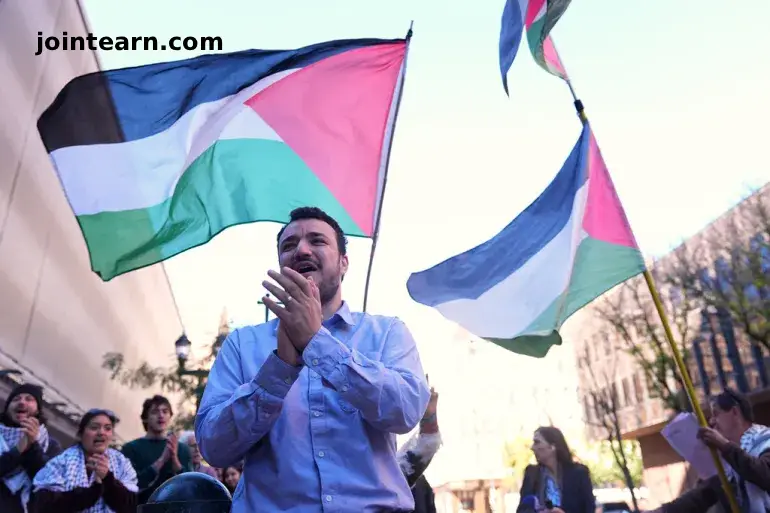
Lawyers for Mahmoud Khalil, a Palestinian rights activist, have urged a United States appeals court to uphold a lower court’s ruling that freed him from immigration detention, arguing that the government’s attempts to deport him are a politically motivated attack on free speech.
Khalil, who became a prominent figure after participating in pro-Palestine protests at Columbia University last year, told supporters outside the Federal Court in Philadelphia that his case represents a “test for everyone’s rights.”
“Nothing should deter anyone from speaking out for the liberation of Palestine, for the rights of immigrants everywhere,” Khalil said after Tuesday’s hearing.
He added that, based on the hearing’s tone, there appeared to be “no immediate risk” of being re-detained.
Government Appeals Release Order
The U.S. government is seeking to reverse a June ruling by a New Jersey federal judge that ordered Khalil’s release from detention. Prosecutors argue the lower court lacked jurisdiction, insisting that Khalil’s continued detention was lawful under immigration procedures.
Khalil, a legal permanent resident, was arrested in March 2025 and detained in Louisiana, missing the birth of his first child while in custody. His deportation case, however, remains active and separate from the habeas corpus petition that led to his temporary release.
Free Speech and Targeted Deportation
Khalil was the first well-known Palestinian rights advocate detained and targeted for deportation due to his activism under the Trump administration’s crackdown on pro-Palestine students.
The administration claims that hundreds of foreign students were targeted for deportation for allegedly supporting “terrorism” or promoting “anti-Semitism” — accusations that activists and civil rights lawyers have denounced as politically charged and baseless.
To justify the deportations, the Trump administration invoked a rarely used immigration clause allowing the Secretary of State to expel non-citizens whose presence is deemed to have “adverse foreign policy consequences.”
ACLU: ‘Ideas Are Not Illegal’
Bobby Hodgson, assistant legal director for the American Civil Liberties Union (ACLU) of New York, called the government’s interpretation of the law unconstitutional.
“What our arguments really boil down to is that, in the United States, ideas are not illegal,” Hodgson said at a briefing after the hearing.
“The government cannot weaponize a vague immigration law to incarcerate or remove people for expressing opinions with which they disagree.”
Civil liberties advocates have warned that Khalil’s case could set a dangerous precedent for suppressing dissent under the guise of immigration enforcement.
Ongoing Legal Battles
While Khalil’s release order allowed him to leave detention, it did not conclude his immigration case. In September, an immigration judge ruled in favor of the government’s removal order, citing alleged inconsistencies in Khalil’s visa application — including what officials claim was a failure to disclose work for the UN Relief and Works Agency (UNRWA).
Khalil’s legal team has appealed that ruling to the Board of Immigration Appeals (BIA). Should the BIA affirm the decision, the case is expected to escalate to a federal circuit court on constitutional grounds.
In the meantime, several other Palestinian and pro-Palestine activists have been released under similar habeas corpus petitions, though their deportation cases remain unresolved.
Broader Crackdown Declared Unlawful
Khalil’s case comes amid growing scrutiny of the Trump administration’s broader policy against campus-based Palestine activism.
Last month, Judge William Young ruled in a separate case that the government’s deportation drive targeting pro-Palestine students was illegal, saying it was designed to “silence criticism of Israel” in violation of First Amendment protections.
“We are not, and we must not become, a nation that imprisons and deports people because we are afraid of what they have to tell us,” Judge Young wrote.
A Symbolic Fight
For Khalil, the legal battle is about more than his own status.
“This isn’t just about me,” he said. “It’s about whether this country stands by the principles it claims — that people can speak freely, even when their words make the powerful uncomfortable.”
His supporters, including student activists and human rights groups, have vowed to continue public demonstrations until the deportation proceedings are dropped.
As the legal appeals continue, Khalil remains free — at least for now — and determined to continue his advocacy for Palestinian rights.


Leave a Reply